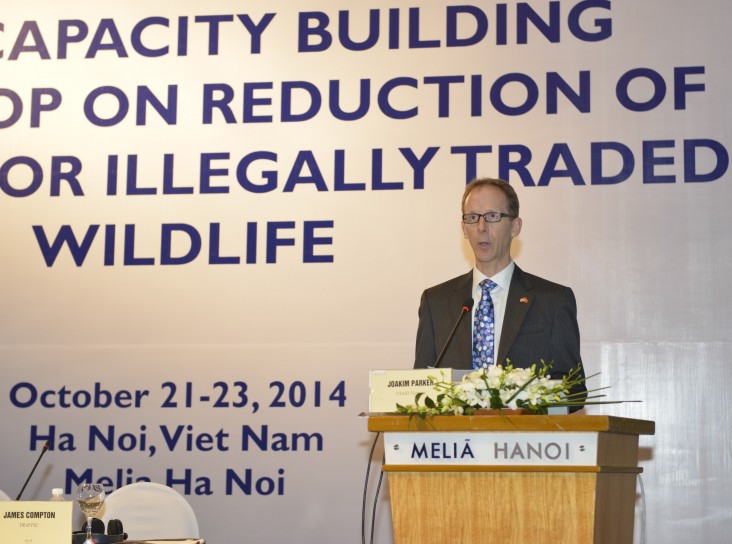
HANOI, October 21, 2014 -- Good morning. It is a pleasure to address this first APEC Capacity Building Workshop on Reduction of Demand for Illegally Traded Wildlife on behalf of the U.S. Government. I should add that I do so coming from the development perspective, as I represent U.S. Government development cooperation with Vietnam.
Wildlife trafficking undermines security and funds criminal networks. It seriously challenges national development by undermining economic growth and corroding the rule of law. Reductions in biodiversity have longer term consequences for development.
The slaughter of elephants for ivory, the brutal harvesting of rhino horn and the illegal trading of species such as lemurs in Asia represents the highest profile part of the illegal $19 billion dollar market involved. As illegal trade it is exceed only by weapons and drugs. That’s a lot money that could be spent on legal domestic products, stimulating positive commercial activities, instead of decimating species and supporting criminals. Working together, we can stem the losses of our wildlife around the world and promote higher quality development. The U.S. Government is therefore pleased to work with APEC representatives as we meet leadership’s call to “combat wildlife trafficking by international cooperation.” A problem like this that is both domestic and cross-border requires cooperation – cooperation both across agencies within governments and among governments. APEC provides our leaders a unique platform to highlight the important linkage between economic growth and securing our trade networks against illicit and illegal trade, and to share approaches to demand reduction.
In 2013, the presidents of the United States and Vietnam joined their fellow APEC Leaders in a call to reduce “the supply of and demand for illegally traded wildlife, increasing public awareness and education related to wildlife trafficking.” Prime Minister Dung, President Obama, and other APEC Leaders have recognized the importance of cooperation and demand reduction to address this issue. We have welcomed actions this year by Vietnam on trafficking, and hope that reports of a possible recent downward trend in demand are proven true. If they are not proven, then we have a further example of the complexity of the issues and the importance of the call for enhanced education and mass media reporting on regulations and wildlife trade is important.
USAID recently acknowledged the challenges and opportunities for cooperation in Vietnam by prioritizing Vietnam as a Tier 1 biodiversity country for assistance in combatting wildlife trafficking. We are now working with the Government of Vietnam and other stakeholders to determine the best way forward with such assistance. The U.S. Government uses such bilateral cooperation with partners like Vietnam to complement its support for regional efforts in both APEC and the Association of Southeast Asian Nations. USAID funds the Asia Regional Response to Endangered Species Trafficking program --ARREST which built on our support and engagement with the ASEAN Wildlife Enforcement Network (ASEAN-WEN). Like our work here in APEC, the ARREST program seeks to reduce the demand for illegally traded wildlife. It also provides training to help law enforcement deter illegal trade.
I would like to thank Vietnam for volunteering to host this capacity building workshop and coordinate with the United States on this important issue. We must all challenge ourselves to cooperate within APEC to stem the flow of illegally traded wildlife and reduce the demand for illegally trafficked wildlife. If we act now with resolve, our combined efforts will help safeguard animal populations and improve development outcomes for generations to come. I wish you a successful fruitful workshop – clearly, there’s no time to lose.
Thank you (Xin cam on).
---
For photos of the event, visit: https://flic.kr/s/aHsk5t59ed







Comment
Make a general inquiry or suggest an improvement.